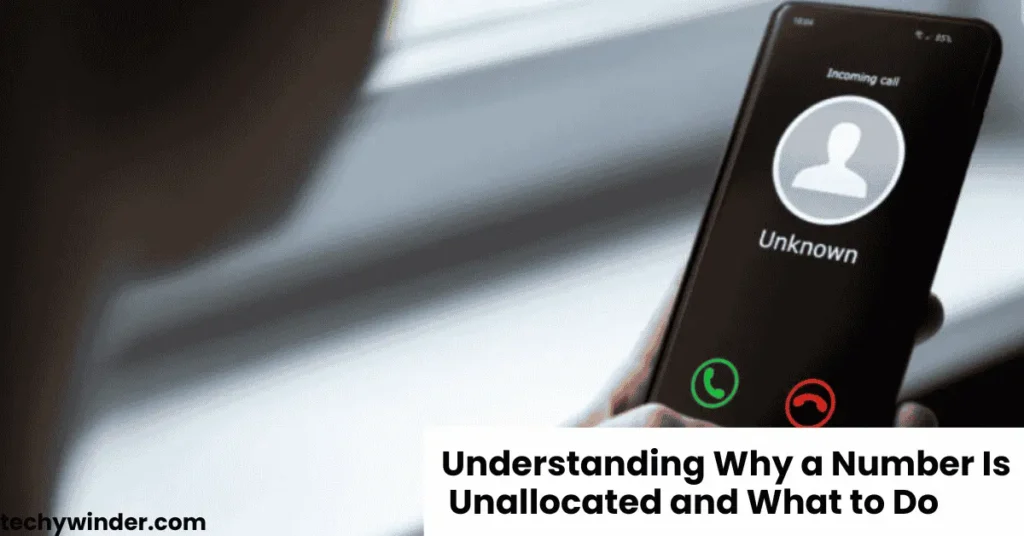Hearing “the number you have dialed is unallocated” simply means that the phone number you are trying to call has not been assigned to any user by a telecom carrier. This status indicates that the number exists in the system but is currently inactive or unavailable.
Why Do Unallocated Numbers Exist?
Unallocated numbers are part of the telecom ecosystem and serve specific purposes:
- Future Allocation: Carriers reserve numbers to assign them to new customers later.
- Deactivated Lines: A phone number can become unallocated if a previous user has disconnected their service.
- Inactive Number Ranges: Some numbers, particularly in certain area codes or prefixes, may not be active yet.
Common Reasons You Encounter an Unallocated Number
If you come across an unallocated phone number, it could be due to one of the following reasons:
1. Misdialing or Typographical Errors
- Incorrectly entering a phone number can result in dialing a non-existent or unallocated line.
- Double-check the number for accuracy before calling again.
2. Disconnected or Reassigned Numbers
- Numbers that are no longer in service may revert to an unallocated status.
- Businesses or individuals who close their accounts may leave their numbers deactivated.
3. Caller ID Spoofing
- Some scammers use spoofing techniques to disguise their real number as an unallocated one.
- This tactic is common in fraudulent activities to prevent tracking.
4. Technical Issues in the Telecom System
- Temporary glitches can occasionally cause an active number to appear unallocated.
What Does It Mean If a Phone Number Is Unallocated?
An unallocated phone number indicates that the number is not linked to any user or active subscription. Here are some specific points to keep in mind:
- No Current Assignment: The number is available but not being used.
- Temporary Status: Numbers may transition to unallocated status after being released by a previous user.
- Fraud Risks: Unallocated numbers can be misused by fraudsters for scams.
How to Identify an Unallocated Number
Identifying whether a number is unallocated can save time and effort. Here are some indicators:
- Error Message on Dialing: You will hear a recorded message stating, “The number you have dialed is unallocated.”
- No Caller Details: Incoming calls from unallocated numbers may appear with little or no identifying information.
- Frequent Issues: Consistently failing to reach a number suggests it may no longer be active.
What Should You Do If You Encounter an Unallocated Number?
If you dial a number and receive an unallocated error, follow these steps:
- Verify the Number:
- Check for any mistakes in the digits.
- Reach out to the person or business to confirm the correct number.
- Contact Your Provider:
- If you are certain the number is correct, contact your telecom service provider for further assistance.
- Avoid Repeated Calls:
- Do not attempt to repeatedly dial an unallocated number as it will not connect.
Why Do Scammers Use Unallocated Numbers?
Unallocated numbers are often used by scammers due to their anonymity. Here’s why:
- Hard to Trace: Since the number isn’t tied to a user, it’s difficult to track the origin of the call.
- Appears Anonymous: Spoofed calls using unallocated numbers can make recipients believe the call is legitimate.
Preventive Tips Against Scammer Calls
- Don’t Answer Unknown Numbers: Let unfamiliar calls go to voicemail.
- Block Suspicious Numbers: Use your phone’s blocking feature for unallocated numbers.
- Report the Call: Notify your telecom provider or authorities if you suspect fraud.
What Does an Unallocated Number Mean for Businesses?
For businesses, using a phone number that becomes unallocated can impact communication with customers. Here’s why:
- Lost Customer Trust: Clients may be unable to reach you if your number is inactive.
- Operational Disruption: A reassigned or unallocated number can create confusion and delays.
Avoiding Unallocated Numbers as a Business
- Regularly monitor your phone lines to ensure they remain active.
- Inform clients immediately if your number changes.
How to Protect Yourself From Fraudulent Use of Unallocated Numbers
Unallocated numbers can sometimes be used in deceptive practices. Here’s how you can stay safe:
- Educate Yourself About Spoofing:
Be aware of how scammers might use unallocated numbers to impersonate legitimate entities. - Use Caller ID Apps:
Install applications that flag potentially fraudulent calls. - Verify Suspicious Calls:
Always confirm the legitimacy of a call before sharing sensitive information.
Frequently Asked Questions
Conclusion
Hearing “the number you have dialed is unallocated” can indicate anything from a misdial to a deactivated or reserved phone number. While unallocated numbers are a natural part of the telecom system, they are sometimes exploited for fraudulent purposes. By understanding their meaning and taking appropriate precautions, you can navigate these situations safely and efficiently. Always verify numbers carefully and avoid engaging with calls from unknown or suspicious sources.



